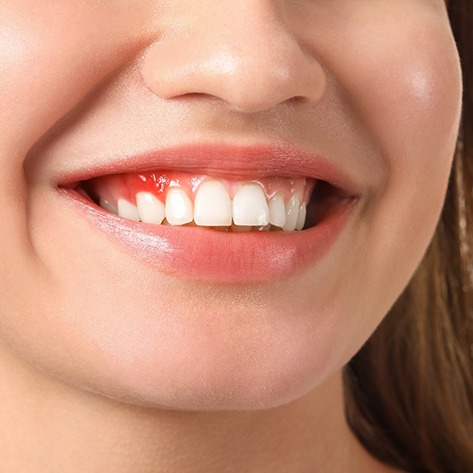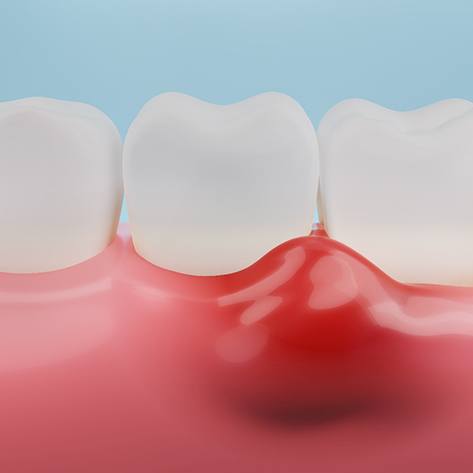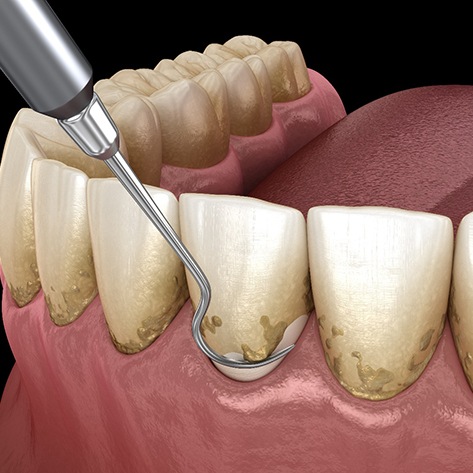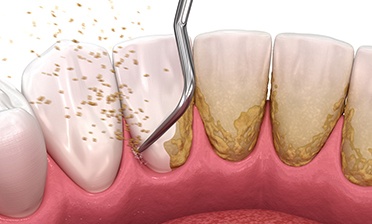Gum Disease Treatment West Loop Chicago
Improving the Health of Your Gums
Gum disease is more of a threat to your oral health than you might realize. Your teeth rely on healthy gums to provide them with support; if gum disease goes untreated for too long, you could end up with gaps in your smile. Here at Washington Dental Care West Loop, our dentists can help address your gum disease with scaling and root planing as well as antibiotic therapy. Are you worried about the health of your gums? Call us today!
Why Choose Washington Dental Care West Loop for Gum Disease Treatment?
- Arestin Antibiotic Therapy Available
- Comfortable, Thorough Scaling and Root Planing
- Caring, Knowledgeable Dental Experts
What is Gum Disease?

Gum disease is what happens when the bacteria in your mouth infect the soft tissues protecting the roots of your teeth. There are two main stages of gum disease: gingivitis and periodontitis. Gingivitis tends to have milder symptoms, and dealing with it can be as easy as simply improving your brushing and flossing habits. Meanwhile, periodontitis is a much more advanced problem that can have severe consequences for your oral health.
In some cases, gingivitis can be reversed if you act quickly enough. However, once gum disease reaches the periodontitis stage, it cannot be cured. At that point, the best thing to do is to manage it so that it doesn’t grow any worse.
Symptoms of Gum Disease

Do your gums appear to be red or swollen? Have you noticed blood on your toothbrush or dental floss once you’re done using them? Do some of your teeth look longer than they used to? Have you noticed any changes in your bite? Are some of your teeth loose?
If you answered in the affirmative to any of the questions above, you could potentially have gum disease. It’s best to schedule an appointment with our team as soon as possible so that we can diagnose and treat the problem.
How Do We Treat Gum Disease?

There’s more than one way to treat gum disease. In order to determine the best approach in your case, we’ll need to perform an examination of your mouth. This will let us see how advanced your gum disease is. Once we have gathered the necessary information, we can go over your options and put together a treatment plan that has been tailored to your specific needs.
Scaling & Root Planing

Since traditional brushing, flossing, and even professional cleanings aren’t enough to address gum infections, we typically recommend scaling and root planing. Scaling uses dental instruments to gently clear away hardened plaque and tartar deposits from above and below the gum line, while root planing is intended to smooth out the roots of teeth to help them reattach to the gums and prevent the risk of future infection. Keep in mind that scaling and root planing are usually performed over multiple appointments, especially for more severe cases.
Do I Need Scaling & Root Planing?

Scaling and root planing in West Loop Chicago is typically recommended for patients exhibiting either early or later signs of gum disease. These include:
- Bleeding gums whenever you brush or floss your teeth.
- Receding gums, which make your teeth look longer.
- Persistent bad breath.
- A bad taste in the mouth.
- Shifting or loose teeth.
- Difficulty or discomfort while chewing.
- Visible plaque and tartar accumulation.
We advise all of our patients to visit us for checkups and cleanings every six months. That way, we can spot early signs of gum disease and have them quickly treated with scaling and root planing before the infection has an opportunity to progress.
The Scaling & Root Planing Process

Scaling and root planing take place over the course of two appointments. At your first visit, he’ll thoroughly clean all plaque and tartar from the surface of your teeth as well as down in the pockets of the gums, which is where bacteria love to hide.
The next part of the process is root planing, which is where we will remove any hard pockets of bacteria from the roots of the teeth. In some cases, this will allow the gum tissue to healthily reattach to the teeth to protect the roots and prevent tooth loss. It will also slow or even stop the progression of the infection.
Aftercare Tips for Scaling & Root Planing

After the local anesthetic wears off following your treatment, you’ll likely experience some soreness and tenderness for the next several days. We recommend avoiding eating for at least two hours following your procedure and rinsing your mouth with salt water regularly throughout the day to help with any discomfort. We advise that you continue brushing your teeth as you normally would while being mindful of not brushing too hard.
Antibiotic Treatment

As part of your gum disease therapy, we’ll also administer Arestin antibiotics in order to promote further healing of your oral tissue. To do this, we place tiny microspheres of antibiotic gel directly into the newly formed gum pockets that appear as a result of gum disease. Over the next several days, the spheres will slowly release the antibiotics into your gum tissue, healing it in between your follow-up appointments. When you come back, we’ll confirm that the antibiotics are working as intended.



